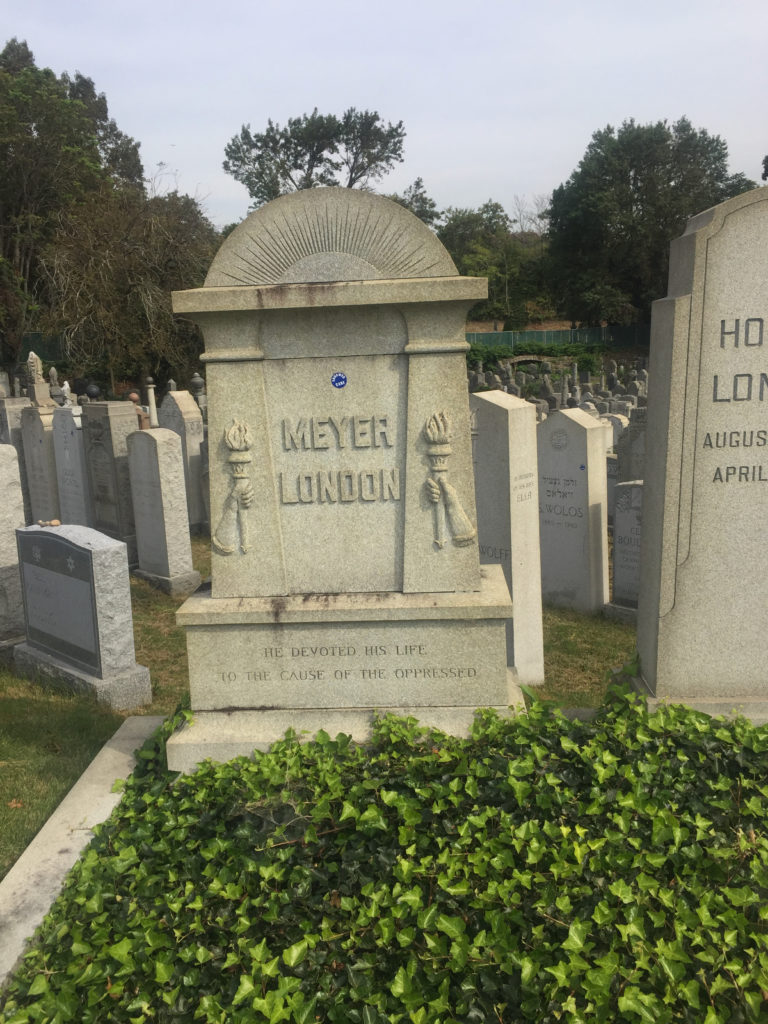Erik Visits an American Grave, Part 919
This is the grave of Meyer London.

Born in 1871 in Lithuania, which was then part of Russia, London came from a leftist Jewish family. His father was a former rabbi who had converted to socialism, though his mother remained devout. That must have led to some interesting family tensions. His father went to the United States in 1888 but he left his older son behind, taking Meyer’s younger brother with him. That was pretty common. Men frequently started family migration chains, saving money to bring over the family. Same thing happens with Latin American immigration to the U.S. today.
London then attended school, both religious and secular. In 1891, the rest of the family came to New York. London was educated enough to support himself as a tutor in New York. He then became a librarian. But his real interest was socialism. He read a ton and started attending political meetings. There was no shortage of socialist meetings in Jewish New York. He thrived in this fertile ground. He became a leader in the socialist community, an excellent public speaker, and then went to law school at NYU to improve his education and continue to move up in the political world. London became a labor lawyer at a time when the law was very much against workers. He also took a lot of cases for tenant rights when landlords ruled the roost. He became a big supporter of the first Russian Revolution as well, publishing the October Manifesto in New York and then leading fundraising efforts for victims of the oppression that followed its crushing by the Czar’s troops.
London was first a Socialist Labor Party member, which was Daniel De Leon’s radical party that called for the overthrow of the state. However, he left after he became a follower of Eugene Debs. Instead, he became part of Debs’ Socialist Democratic Party of America, which eventually became the Socialist Party of America. Given where he lived, it was possible to win elected office as a socialist. He ran for various offices, but lost most of the time. He gained greater renown as the lawyer for the International Ladies Garment Workers Union in the Uprising of the 20,000 and other big labor actions of the time period. Thus, in 1914, London became the second Socialist ever elected to Congress.
As a Socialist in Congress during World War I, London had to walk a very fine line. The Socialists opposed the war. So did London. But once the U.S. joined, London felt it was important to support the effort. He hated the Sedition Act and Espionage Act. In fact, he was the only vote against the Sedition Act in the House. But he would also not break entirely from supporting Wilson. He even went so far as to support the sale of Liberty Bonds This led to a lot of criticism on the left in the U.S., who saw him as a sellout. What was the purpose of a Socialist in Congress if he supported a capitalist war, they cried. He also tried to walk a fine line on Zionism, neither actively supporting nor condemning it, which led to anger from both sides of that debate.
So this was not a good electoral situation. The left saw London as a huge sellout. Conservatives saw him as a pro-German traitor to the nation. Zionists thought he sold out Jews. Anti-Zionist Jews thought he was too close to Zionists. The Orthodox hated him because he was not religious enough. Suffice it to say that London did not win reelection in 1918, though it was a fairly close election.
However, London still remained a major player on the Jewish left and his Lower East Side district sent him back to Congress in 1920, as the Red Scare was beginning to abate. He served one additional term before losing again in 1922.
London remained active in politics and working on his law practice until he got plowed down by a car when for some reason he got confused crossing a road in 1926. He was 54 years old.
Meyer London is buried in Mount Carmel Cemetery, Queens, New York.
If you would like this series to visit other leading Socialist Party members, you can donate to cover the required expenses here. Victor Berger is in Milwaukee, Wisconsin and Walter Thomas Mills is in Glendale, California. Previous posts in this series are archived here.
